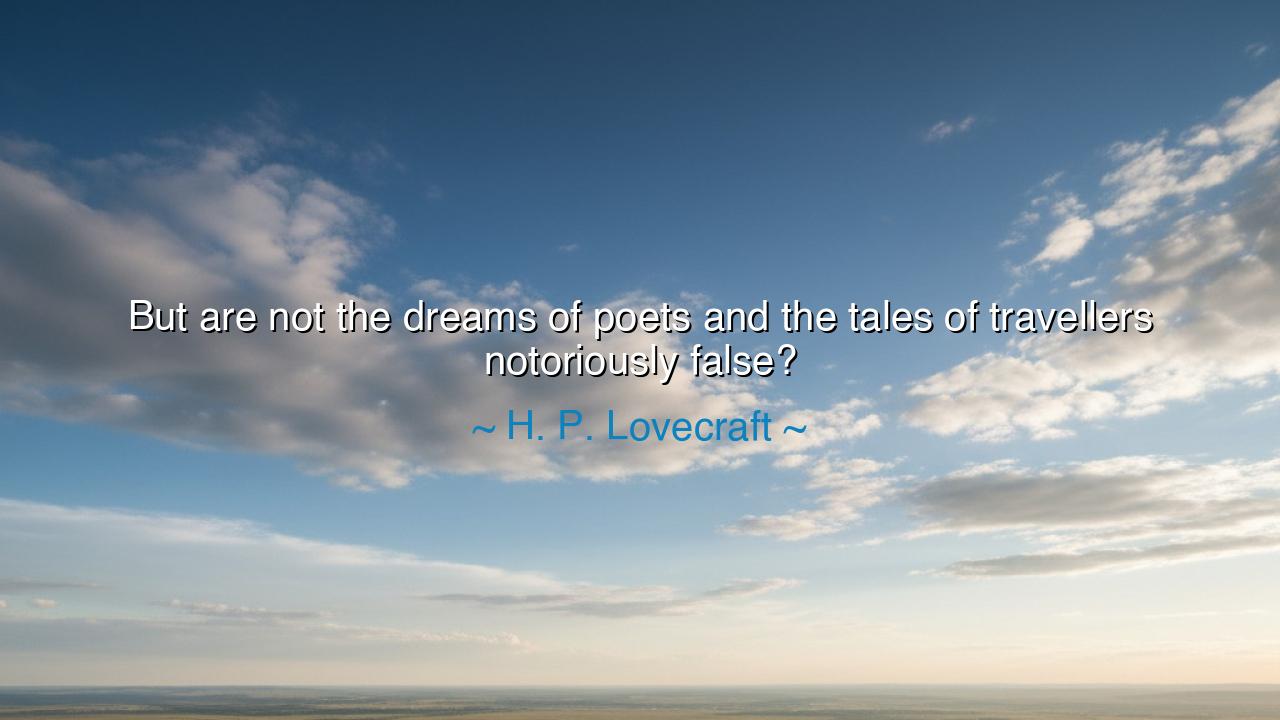
But are not the dreams of poets and the tales of travellers






The words of H. P. Lovecraft, whispered through the mist of imagination and dread, carry a timeless irony that trembles with both doubt and wonder: “But are not the dreams of poets and the tales of travellers notoriously false?” In this reflection lies a question older than literature itself — a challenge to the fragile bridge between reality and imagination, between the known world and the worlds that live within the human mind. Lovecraft, master of cosmic terror and architect of unseen realms, did not ask this question idly. He understood that mankind’s greatest truths often arrive clothed in fable, and that within the falsehoods of poets and wanderers might dwell the deepest glimpses of eternity.
The poet and the traveller, in Lovecraft’s eyes, are kindred spirits — both seekers of meaning beyond the boundaries of ordinary experience. The poet travels inward, through the labyrinths of the soul, while the traveller ventures outward, across the shifting horizons of the world. Yet both return bearing tales that defy reason. They speak of marvels, of cities that shimmer and vanish, of gods that whisper through dreams. The ordinary man, bound to his small certainties, calls them liars; yet it is through such liars that humanity touches the infinite. Lovecraft’s question, therefore, is not a denial, but an invitation — to ask whether truth might hide precisely in that which appears false, whether the dreams of poets and the tales of travellers might reveal what cold reason cannot see.
From the earliest ages, humanity has wrestled with this paradox. When Homer sang of Olympus and Troy, many dismissed his tales as myth. Yet within his verses lay not mere fancy, but the essence of courage, glory, and fate — truths too vast for fact alone to contain. When Marco Polo returned from the East, speaking of cities of marble and emperors of unimaginable wealth, many in Venice mocked him as deluded or deceitful. Centuries later, scholars confirmed much of what he saw. Thus, what is “false” today may, in time, become the foundation of truth. The tales of travellers, like the dreams of poets, are woven of both imagination and revelation; they are mirrors of possibility, and possibility is the seed of all discovery.
Lovecraft, ever the skeptic and visionary, stood at the threshold between rational science and mystical terror. He lived in an age when the universe was being unveiled — stars measured, atoms split, and ancient mysteries dispelled by logic. Yet the more mankind learned, the more Lovecraft felt the chill of cosmic insignificance. His question — “Are not the dreams of poets and the tales of travellers notoriously false?” — becomes a veil for deeper unease. Perhaps he is saying: even as we expose the myths of the past, do we not create new ones? Even as we claim mastery of truth, do we not still dream false dreams — of progress, of order, of safety in an infinite cosmos that may, in truth, care nothing for us?
There is wisdom, however, in embracing the false as a vessel for truth. The poet’s lie may reveal the shape of the human heart; the traveller’s exaggeration may awaken the yearning for adventure. To call them false is to misunderstand their purpose. For what the poet speaks is not literal but symbolic, and what the traveller tells is not geography but experience. When the poet dreams of gods, he is speaking of ideals; when the traveller invents monsters, he is confessing his fear of the unknown. In this way, all that is “false” becomes the language by which truth is made bearable. Lovecraft himself did this — creating cosmic horrors not because he believed in them, but because they embodied what could not otherwise be spoken: the trembling awe of man before the infinite.
Consider, too, the story of Christopher Columbus, who sailed west seeking a route to India. He dreamed of golden kingdoms and endless riches — dreams that were, in one sense, false. Yet by chasing those falsehoods, he changed the world forever. His “mistake” redrew the map of humanity. So it is with all dreamers and wanderers — their visions may deceive, yet from those deceptions, new realities are born. The falsehood of the visionary is the price of progress; it is the necessary illusion that compels the soul to act, to explore, to create.
Thus, the lesson of Lovecraft’s question is this: do not scorn the dreamers, nor the travellers, nor the poets whose tongues weave impossible worlds. For though their stories may not be “true” in the language of facts, they are true in the language of meaning. Their dreams move humanity forward — teaching us to see beyond the walls of the known, to reach toward what might be. The falsehoods of imagination are the seeds of truth yet to come.
Therefore, dear listener, honor the poets and the wanderers. Dream boldly, even at the risk of being mistaken. Speak of what you have seen — whether in your mind or across the earth — and let others call it false if they must. For truth, like light, is often first seen through the shimmer of illusion. And as Lovecraft himself might whisper from beyond the veil: the greatest realities may yet lie hidden in the dreams we dare to believe are false.






AAdministratorAdministrator
Welcome, honored guests. Please leave a comment, we will respond soon